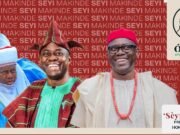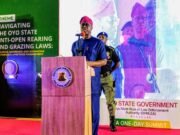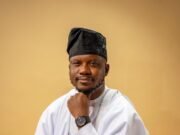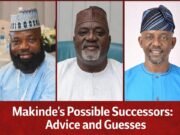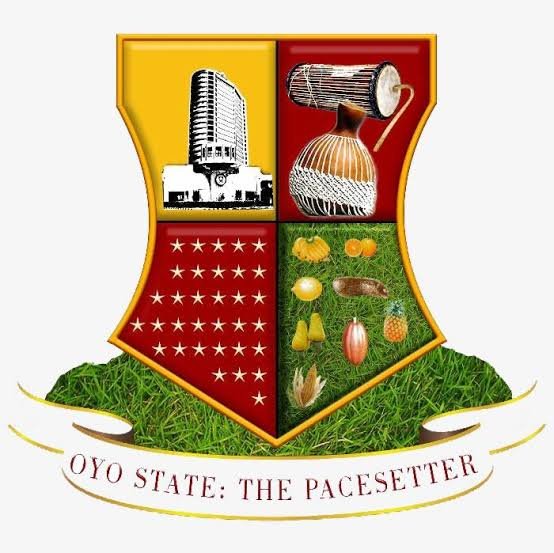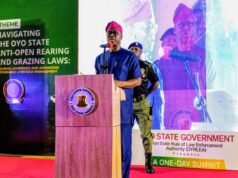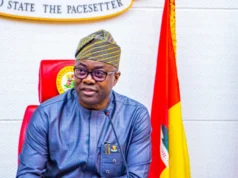In January, the airwaves in Oyo State and by extension the southwest were inundated with acerbic attacks against establishing the Sharia Panel for arbitration in Oyo town. That time, criticism against the panel forced the proponent to abandon the idea slated for January 11, 2025, for fear of violence and mayhem. While the official launching of the panel was shelved in Oyo town, that of Ado-Ekiti went as planned. In the days after a picture of three Islamic clerics holding a session inside the Ado-Ekiti central mosque surfaced on the internet, the state government, in particular, swiftly rose against it with ferocity. “There is an existing legal structure in Ekiti State (i.e Customary Court, Customary Court of Appeal and High Court) that has been handling issues relating to Islamic, Christian and traditional marriages and inheritance without rancor or agitation”, Dayo Apata, (SAN), the commissioner for Justice and Attorney General argued in a statement made available to the media.
He added that the Sharia Courts in the North are equivalent to the Customary Courts in the Southern part of Nigeria; wherein appeals from Sharia Courts in the North go to the Sharia Court of Appeal, the state similarly has the Customary Court of Appeal that hears appeals from the Customary Courts. Apata’s strongly worded statement quickly put the Muslim community and their leader Sheikh Jamiu Kewulere, under the spotlight for allowing themselves “to be used as tools by politicians and fifth columnists”, adding that the government will not hesitate to invoke the full weight of the law to protect the constitution of the federation and maintain peaceful co-existence in the state. As the media trial against the Muslim leaders fell by the wayside, the state government clandestinely asked the Ewi of Ado-Ekiti, Oba Rufus Adeyemo Adejugbe, to openly and publicly fire shots at the Sharia Panel “in the interest of peaceful coexistence and law and order in the community”.
For the next several weeks, the debate over the legality and constitutionality of the panel dominated conversations and sparked a hot-button argument that reverberated beyond the southwest. Typical of any contentious public debate in Nigeria, the topic quickly became the ‘for/against’ discourse with opinions clashing on both the new and traditional media, thereby erasing any attempt to have a middle ground. Once again, as I argued in one of my columns on the topic, that whole debate on the Sharia Panel only exposed the level of religious intolerance and bigotry in Yorubaland. In his first public statement over the issue, Governor Seyi Makinde told the Muslim Community of Oyo State delegation led by its chairman, Alhaji Kunle Sanni, that “Oyo State will not permit anything illegal. If their actions (Sharia Panel proponents) are within the law, fine, if not, they should expect that I will insist the law must be followed”. Three months after the noise around the panel subsided, Governor Seyi Makinde made a dramatic U-turn and backtracked from his earlier position on the issue.
In the period between January and March, a lot has happened that must have informed the position of the governor – I am not privy to those nuances. In essence, Governor Makinde’s readiness and willingness to rethink and re-examine his perspective on the issue, is a reflection of his leadership style, one that is flexible and adaptive to changing times. Unlike in Ekiti, where the state government has maintained a rigid position partly because of the religious dynamics among the people, in Oyo State, the change of the governor’s position jolted both the Muslim and non-Muslim alike. Questions such as what must have happened behind the scenes quickly flooded social media. For a Governor who has played a smart-aleck on the controversial issue to publicly acknowledge the state’s religious plurality and diversity speaks volumes. Take my trip to Lagos in February. Kicked off that month alongside four course-mates at the School of Politics, Policy and Governance, to Lagos, as we held our hangout. In the car, I raised the issue of the Sharia Panel, which was a hotly debated topic across the media. One of the things I did was to listen to the perspectives of my co-travelers on the issue.
Fortunately, my mates, all Christians were gracious enough to bare their minds. One person, let’s call him Ayo, said the fear expressed across the media stems from the reality in northern Nigeria, where enforcers of the Islamic code of conduct often force non-muslims to live by Sharia. He asserted that the activities of organizations such as Hisbah in Kano, for instance, were enough to raise suspicion and doubt over the intention of proponents of the panel. He argued that having the President and the Vice President being Muslims equally heightened tension and suspicion against the panel. “A particular tweet recently circulated on social media where an influencer accurately posted that if a Muslim-Muslim ticket sails through, an attempt will be made in the southwest to have some sort of Sharia-driven agenda”, Ayo contended. In her words, Aanu, not her real name, admitted that her fear of the Sharia panel stemmed from the media framing and the fear expressed within her circle of influence. “I don’t know much about the Sharia Panel brouhaha, safe for the media framing and condemnation from my circle of influence”. The other co-traveler only made occasional interjections whenever the conversation struck a chord.
As I equally bared my mind, it was evident that my claim would be respected. So, I freely expressed my thoughts confidently. First off, I began by acknowledging their position, admitting that the way Sharia is painted in the North makes it unattractive to people outside the zone. I posited that a Muslim can err, like anyone who practices a different religion, but criticism should be directed to that faithful and not to the faith. “What opponents of this Sharia panel don’t know is that Muslims live their personal lives by the Sharia, which is the Islamic law, drawn primarily from the Qur’an and Hadith”, I contended. So basically, the idea behind the Sharia Panel for Arbitration was simply an attempt to address various grey issues surrounding marriage, divorce, inheritance, etc”. For the avoidance of doubt, I pointed out that Muslim marriages are conducted with Sharia, but the dissolution of such marriages is conducted in customary courts where the nuances of the Sharia are often sidelined. While my position on the Sharia Panel may not represent the entire picture of this conversation, I believe an open, insightful, and respectful approach to both contentious ethno-religious conversations will always leave us better, wiser, and smarter than we would ever be. And as the Governor noted, “My position is that we will support anything that’s in our Constitution. “The interpretation on my side is that, even in our families, it is not every issue we take to court. When people have disagreements, the elders in the family try to settle the dispute.
“So, on this particular Sharia panel, whoever wants to patronize it and feels it is an alternative dispute mechanism, it is okay. It will help the government and ensure that the number of cases going to our judges is reduced. We will encourage alternative dispute resolution mechanisms and the only thing I can say is that if it is something to be enforced or that needs more clarity, you still have the court, which is recognized by the Constitution.
OYO101 is Muftau Gbadegesin’s opinion about issues affecting the Oyo state and is published every Saturday. He can be reached via @Upliftnuggets on X, muftaugbadegesin@gmail.com, and 09065176850.




